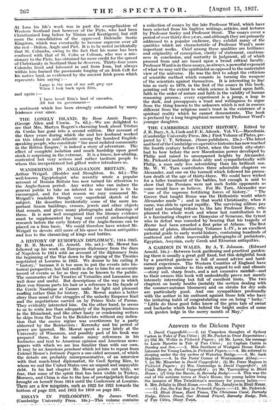THE CAMBRIDGE ANCIENT HISTORY. Edited by J. B. Bury, S.
A. Cook and F. E. Adcock. Vol. VL—Macedonia. (Cambridge University Press. 30s.) First Volume of Plates, pre- pared by C. T. Seltman. (Same publishers. 25s.)—The latest and best of the Cambridge co-operative histories has now reached the fourth century before Christ, when the Greek city-states had to bow before the new Macedonian power developed by Philip and raised to unsurpassed heights by Alexander. Mr. Pickard-Cambridge deals ably and sympathetically with Philip, a man only less astonishing than his brilliant son. Mr. W. W. Tarn contributes three admirable, chapters on Alexander, and one on the turmoil which followed his prema- ture death at the age of thirty-three. We could have wished for a fuller treatment of the battles, but enough is said to show that the Persians were not such feeble opponents as some would have us believe. For Mr. Tarn, Alexander was " one of the supreme fertilizing forces of history." " The Greece that taught Rome was the Hellenistic world which Alexander made " ; and in that world Christianity, when it came, was able to spread rapidly. The surviving editors pay brief and touching tribute to, the late. Professor Bury, who planned the whole work and whose last contribution to it is a fascinating ehapter on Dionysius of Syracuse, the tyrant who in defeat was consoled by hearing that his tragedy of Hector had been awarded a first prize at Athens.. The first
volume of plates, illustrating Volumes is an excellent pictorial guide to early world-history, containing hundreds of scattered and often inaccessible photographs of prehistoric, Egyptian, Assyrian, early Greek and Etruscan antiquities.






























 Previous page
Previous page